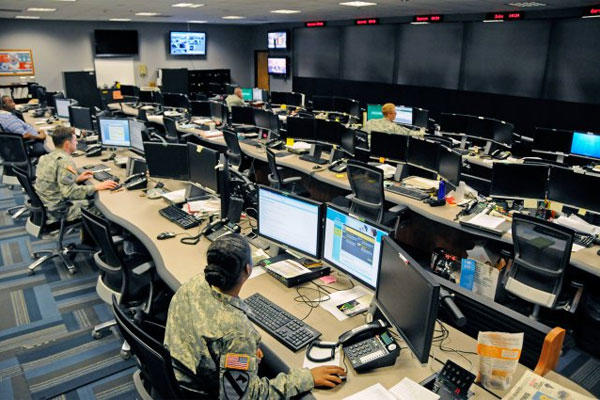The U.S. Defense Department's relatively new Cyber Command has received its "first wartime assignment" in the fight against the Islamic State, the Pentagon's top civilian said.
Defense Secretary Ashton Carter made the statement during a question-and-answer session after a speech Tuesday at the Center for Strategic and International Studies, a defense think tank in Washington, D.C.
"I have given the Cyber Command in the counter-ISIL fight really its first wartime assignment," Carter said, referring to another name for the group known as the Islamic State in Iraq and Syria, or ISIS.
"What that means is to bring the fight to ISIL in Syria and Iraq," he added. "It means interrupting their ability to command and control their forces, interrupting their ability to plot including against us here and anywhere else against our friends and allies around the world, interrupting their finances, their ability to dominate the population on territory they have tried to establish this nasty ideology."
Carter said, "All that, we can approach in part through cyber."
The secretary used the occasion to unveil proposed updates to Goldwater-Nichols Act, the 1986 legislation that reorganized the structure of the Defense Department in part by empowering the Joint Chiefs of Staff and streamlining the chain of command from the president to the defense secretary to the combatant commanders.
Carter said he wants to bolster the role of Joint Chiefs chairman to include "synchronizing of resources globally" and "planning complex operations," increase authority for service chiefs to more closely oversee weapons acquisitions, further streamline some combatant command headquarters and possibly elevate "the role of Cyber Command," and expand the range of assignments that qualify for joint duty.
His remarks about Cyber Command, which was created in 2009 and is based at Fort Meade in Maryland, came in response to a question posed by John Hamre, the president and chief executive officer of the center and a former Pentagon comptroller and deputy defense secretary.
Hamre said, "Any future war we fight will probably begin in the cyber space, really. How do you see that we integrate the physical fight that's kind of led and planned and coordinated by regional combatant commanders with a Cyber Command? How is that going to work?"
Carter said that while Cyber Command is currently structured as a service within geographic combatant commands, "it's more complicated than that" because its responsibilities cross multiple regions such as Central Command, Africa Command and European Command.
The secretary noted the recent bombings in Belgium at the airport and subway system in Brussels, attacks that were carried out by ISIS militants even though the organization largely operates in the Middle East. The suicide bombers killed almost three dozen people, including four Americans, and wounded more than 300 others. Gail Minglana Martinez, 41, the wife of Air Force Lt. Col. Kato Martinez, died of injuries suffered in the airport bombing and Kato Martinez and four of the couple's children were also injured in the bombings.
Separately on Tuesday, Navy Adm. Michael Rogers, the head of Cyber Command and director of the National Security Agency, said the possibility of non-state actors like ISIS terrorists using cyberattacks to inflict pain on the U.S. and other nations was among his top three concerns.
Rogers noted that ISIS- affiliated operators had posted the personal information and photographs of more than 100 U.S. troops online last spring in an act of threat and intimidation.
"Not only did the hackers for ISIL publicize the personal details on these Americans, but ISIL also called for jihad against them, urging followers in the United 5 States to assassinate them and their family members," he said. "While there is no direct link between this ISIL posting of personal information on service members and the recent extremist attacks in the U.S. and Europe, ISIL wants its followers on the Internet to take inspiration from such attacks."
Referring to the structural challenges now facing the Pentagon, Carter said, "We're increasingly finding the problem not just of inter-regional integration, but of regional-functional integration."
The geographic lines for the combatant commands "are clean as we can make them," he added. "That's perfectly reasonable – you have to divide up the pie somehow. But once you've done that, you have to make sure the slices can work together and haven't artificially created barriers. That's what I'm looking to the chairman for."
In practice, Carter said he already receives such information from the Chairman of the Joint Chiefs of Staff Marine Gen. Joseph Dunford, but he nevertheless wants to codify the practice.
"As a practical matter, I got to have that and I depend upon his professional military advice and his being in constant contact with all the Cocoms," he said, using a term for combatant commands. "But that's the role I want to make sure I clarify and strengthen. The world has gotten more integrated and so we have to get more integrated, too."
-- Richard Sisk and Hope Hodge Seck contributed to this report.
--Brendan McGarry can be reached at brendan.mcgarry@military.com. Follow him on Twitter at @Brendan_McGarry.





























